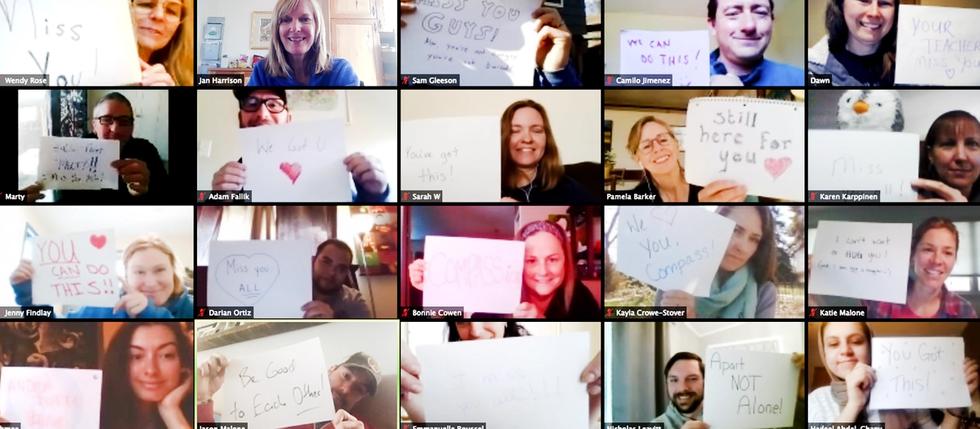Continuous Learning
Learning During COVID-19
Our top priorities going into the school year are:
- Health and safety of students, staff, and families
- Literacy (reading and writing across the curriculum)
- Numeracy (math skills and concepts and application of those skills to real-world problem solving)
- Connection (to each other, to school, to community)
- Equity (all students have opportunity and access)
- Learning to learn (autonomy, curiosity, self-management, and persistence)
Remote learning will use an effective combination of live Zoom classes (math will run one hour per day, Monday-Thursday) and guided independent and group work with a mentor. Mentors will work one-on-one with each student to guide literacy competency and practice and guide independent inquiries for an individualized education in humanities, science, and English.
Literacy
- All students will read and write extensively in ALL classes, and high school students will be using the Norton Field Guide for Writing (5th ed.), the gold-standard in college-level writing texts.
- All students will practice formulating questions and conducting valid, thorough research.
- All students will get frequent feedback on their writing using common rubrics used by all teachers and peers and will be expected to revise their writing based on the feedback they receive.
- All students will have a chance to discuss what they are reading with staff and peers to extend their thinking and deepen their critical reading skills.
Numeracy
- All students will be enrolled in a full-year math course unless they are enrolled in a college math class (in which case these classes are one semester in length) or unless they have successfully completed a college math class and are electing not to continue in math because their Futures Plan does not indicate its necessity.
- All Venture Projects will include explicit practice and application of mathematical concepts and skills.
Connection
- All students will be part of an Advisory that will focus explicitly on connection, social-emotional literacy, and mental and physical health.
Equity
- All students will be assigned a Chromebook for the school year from which they can join classes and groups remotely and have access to all the resources they need to learn and produce high-quality products to demonstrate their learning. We have a limited number of wireless hotspots to distribute to families in need.
- Students will get opportunities to work at their highest potential with access to challenge and support in all subject areas.
- All students will have access to working with peers and teachers whether they are in a hybrid or fully remote environment.
Learning to Learn
Students will get coaching and ample opportunities to practice:
- Staying curious - asking “what if...” and adding “yes, and…” to discussions
- Posing complex questions and seeking answers using design thinking skills (creating, iterating, prototyping, staying in a growth mindset)
- Synthesizing information and presenting ideas clearly
- Collaborating and communicating (listening attentively, speaking leanly, writing persuasively)
- Being self-aware and asking for help when needed
- Being empathetic and supporting others
- Adapting as circumstances change
- Giving and responding to feedback
- Reading, writing, and reflecting on their learning
- Publicly presenting their best products/demonstrations of learning
As a resilient and innovative school community, we know that we are committed to:
- Approaching students holistically with attention to intellectual and emotional development.
- Empowering learners with the mindsets and skills to take charge of their own learning.
- Ensuring an equitable and inclusive learning environment.
- Engaging and motivating students through meaningful projects, student-based interests, and clear learning and skills targets.
- Providing students with high quality, experienced educators who can employ instructional strategies that help all students grow academically and feel emotionally and socially connected.
- Increasing flexibility of the school to respond to students needs to provide “just in time” support and challenge as well as the changing pandemic requirements for the community.
- Research-based responses to the changing landscape of health, learning, and post-secondary readiness.
Hybrid Learning Option:
We are offering three options for every family, plus a fourth option for a limited number of families:
- Option 1: Students attend half-days, in-person, at the school 4 days/week, Monday -Thursday. Math class and Mentoring experiences are fully remote for all students. Friday is an independent workday for all students with an Advisory check-in requirement.
- Option 2: Full-time remote. Students will “Zoom in” to their Advisory and Venture instruction Monday-Thursday. Math class and Mentoring experiences are fully remote for all students. Friday is an independent workday for all students with an Advisory check-in requirement.
Resources:
- A Home School Education by Kayla Crowe-Stover
- Compass Family Guidebook
- Community Resources: Food, Internet, Health
- CDE At-Home Symptom Screening for Parents and Staff
- CDE Guide for Child/Staff Symptom Screening On Campus
- CDE Casos y brotes en los centros de cuidado de niños y las escuelas (School outbreak guidance)
- Covid-19 Guidance for Schools
Continuous Learning Resources
Resources:
- Career Conversations with Teens: A Parent Guide
- Resources for Jobs, College, Fiancial Aid, and Scholarships
- Postsecondary Readiness Support
- Resources for Learning About Anti-Racism
- Resources for Mental Health and Resiliency for Teens and Parents
- No Barriers Curriculum for Middle School Students: Bounce, The Essential Skills & Positive Mindset to Navigate Young Adolescence with Confidence, Purpose & Resilience. See April 20 Newsletter for special Compass Code that makes this program free for Compass students.
